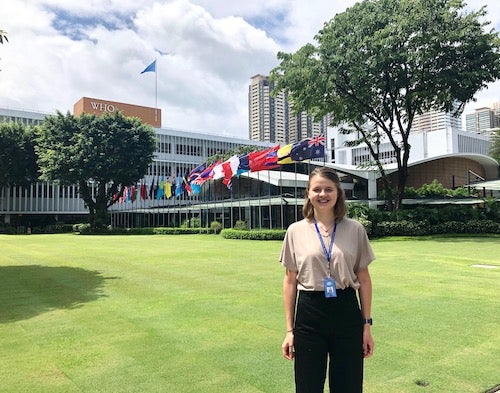Senior Global Health Major Plans Graduate Study in Epidemiology and Medicine
March 25, 2020 – Emily Graul (NHS’20), a global health major, conducted epidemiological research on the dengue virus while completing the Department of International Health’s 12-credit research practicum abroad at World Health Organization offices in the Philippines. After Georgetown, she will pursue a master’s degree at the London School of Hygiene and Tropical Medicine and plans to apply to medical school.

Question: Where did you grow up, and how did you learn about Georgetown?
Graul: I grew up in Nebraska. I enjoyed many subjects in high school and so I was interested in interdisciplinary majors for college. I knew I wanted to enter into a pre-med program, so I was also looking for programs with a health focus and decided to apply to universities with global or public health majors or concentrations.
At the time, Georgetown was one of the few universities that offered a major in global health. I ultimately decided on Georgetown because the location in Washington D.C. was attractive for the internship opportunities, was near family, and would be only a short train ride away from where my twin brother would attend college at Princeton.
Question: How are you enjoying the global health major?
Graul: The global health major has provided me with great mentors and learning experiences. I have enjoyed the ability to take courses focused on a variety of subdisciplines in global health. This, along with other research and internship experiences, has helped me navigate the area of global health in which I want to work in in the future. Beyond the major, I have also appreciated Georgetown’s numerous global health and health-care-focused opportunities school-wide.
Question: Tell us about your research practicum abroad in the Philippines.
Graul: I interned at the World Health Organization Western Pacific Regional Office (WPRO) in the Malaria and Neglected Tropical Diseases (MTD) Unit and the World Health Organization Representative Office for the Philippines (RO), both in Manila. My research at both locations was on the dengue virus.
At WPRO, I researched the dengue surveillance capacities of all the member states in the Western Pacific Region. Also, I developed a clinical flowchart for the case management of dengue, an interesting opportunity given my experience as an emergency medical technician (EMT) with the Georgetown Emergency Response Medical Service (GERMS). At the Philippines RO, my research was on the multiyear epidemiological trends of dengue in the Philippines. This work ultimately became the final research project for my major.
Overall, the internship familiarized me with the sectors of disease control in a real-world setting, and I learned how much I enjoyed applying the epidemiology I learned at Georgetown. I was both fascinated and challenged by dengue’s complex clinical presentation, its dynamic seroprevalence, and its control is increasingly taking a multifaceted approach, employing not only integrated vector management, but also risk communication, surveillance system strengthening, clinical management improvements, and the development of vaccines.
Question: What are you working on for your current internship at the Sabin Vaccine Institute?
Graul: This current academic semester, I am an intern at the Sabin Vaccine Institute, an organization working to expand vaccine access and uptake globally by building upon partnerships and unique perspectives across a variety of sectors. I am interning with Sabin’s Influenzer Initiative, a collaborative effort working to accelerate the development of a universal influenza vaccine. I write the Flu News Friday blog posts on Medium each week for the Influenzer Initiative. I am also researching the barriers in distribution and uptake of influenza vaccines in low- and middle-income countries: although influenza has a substantial disease burden in all countries, unfortunately most flu vaccines are distributed to higher-income countries. Overall, the internship has helped me to develop a deeper understanding of the current structural and scientific challenges present in the current vaccine research and development ecosystem and what is being done to overtake these barriers to drive innovation for a universal influenza vaccine. (Editor’s note: Students are now completing their internships virtually.)
Question: What other activities are you involved in at Georgetown?
Graul: I am an EMT for the Georgetown Emergency Response Medical Service, where I was previously the Director of Alumni Relations. I am also member of GU Students for Health and Medical Equity (GUSHME), a student organization I co-founded in 2018. Last year, I was a trip leader for a new Alternative Breaks Program (ABP) trip to Oaxaca, Mexico, a health care immersion experience I co-founded focused on the intersection of health, culture, and community. My sophomore and junior years I was a student leader for the CURA NHS health care pre-orientation. Otherwise, most of my extracurricular time at Georgetown has been spent researching in an area of global health—as a Global Health Initiative fellow focusing on community health workers regarding maternal and child health programs with Dr. Alayne Adams and Dr. Myriam Vuckovic, and as an intern for the Center for Global Health Science and Security studying pandemic response and global governance during 1918 Influenza Pandemic with Dr. Rebecca Katz.
Question: What are your plans for the future?
Graul: I will be studying at the London School of Hygiene and Tropical Medicine in the MSc in Epidemiology Program for the 2020-2021 academic year. The internship experience at the Center for Global Health Science and Security largely started my interest in disease dynamics and transmission and built a valuable foundation in my understanding of global health security and public health preparedness, while the epidemiology course with Dr. Jennifer Bouey was one of my favorite courses in the global health curriculum. I enjoyed the opportunity to apply the epidemiology I had learned from Georgetown in a real-life setting during my time abroad, but I wanted to learn more advanced methodology. Moreover, I plan on going to medical school, and in the future, I want to practice medicine and conduct epidemiological research.
- Tagged
- hoyas2020
